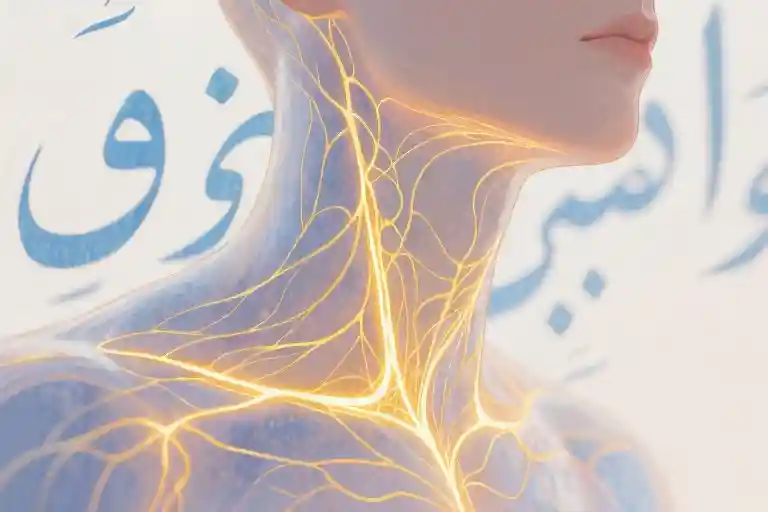The jugular vein runs hidden beneath the skin, a silent lifeline carrying oxygen to the brain with every heartbeat. We rarely notice its presence until something goes wrong—until that moment when a slight pressure reminds us how fragile this thread of life truly is. Yet the Quran tells us something astonishing: “We are closer to him than his jugular vein” (50:16). Not just near, but nearer than the very vessel that sustains consciousness itself.
This proximity defies our usual measurements. We understand distance in handsbreadths and heartbeats, in the space between whispered words and listening ears. But how does one measure closeness when it transcends physical dimensions? When the One being described knows the tremor in your fingers before you reach for the prayer mat, hears the prayer forming in your chest before it reaches your tongue?
There’s an intimacy here that unsettles and comforts simultaneously. Most relationships require negotiation—we choose what to reveal, what to hold back. We polish our vulnerabilities before presenting them, even to those we trust most. But what happens when you stand before a presence that knew your loneliness last Tuesday at 3:17 AM, that felt the unvoiced envy when your friend shared good news, that witnessed the shame you couldn’t confess? The jugular vein at least allows the illusion of privacy—its workings stay mercifully invisible until crisis strikes. This divine nearness offers no such buffer.
Perhaps that’s why the metaphor lands with such weight. The jugular doesn’t operate by our conscious will—we don’t command our blood to flow any more than we command the sun to rise. And isn’t that the essence of this closeness? That the grace sustaining us moves independently of our awareness, that the love holding us requires no petition to begin its work? The vein sustains life quietly; so too does this presence sustain the soul.
You’ve felt this, haven’t you? Those moments when words fail but something shifts nonetheless. When you stare at the prayer rug without kneeling, when your mind whirls too violently for coherent dua, yet somehow—impossibly—you still feel met. The jugular vein doesn’t demand recognition to perform its function; neither does this mercy need our articulation to draw near.
Medical texts describe the jugular’s path in clinical terms: coursing through the carotid sheath, descending beside the trachea. But the body knows it differently—as the pulse quickening during fear, the warmth spreading after relief. Isn’t this the duality of sacred proximity? We can analyze theological concepts of divine immanence, yet ultimately we know it through lived experience: the unexpected peace during turmoil, the strength that arrives unearned, the sense of being profoundly known despite our hiding.
The vein’s vulnerability is its exposure—a well-placed threat could sever life in moments. But this spiritual nearness transforms vulnerability into sanctuary. What we might mistake as exposure becomes instead the ultimate shelter: to be fully seen and yet not condemned, to have every unworthy thought known and still be embraced. The jugular reminds us of mortality; the presence closer than the jugular whispers of something that death cannot touch.
Next time you feel your pulse—fingers pressed lightly against your neck—consider the paradox. That throbbing vessel marks the boundary of your earthly existence, while the reality nearer still promises something beyond all boundaries. The vein keeps time with your temporary life; the presence synchronizes with your eternal breath.
The Flow of Life and the Flow of Grace
There’s a quiet rhythm inside you right now – a steady pulse moving through hidden pathways. The jugular vein does its work unseen, carrying life from heart to brain with silent precision. You don’t command its flow any more than you command the sunrise. Yet this biological marvel, buried beneath layers of skin and muscle, becomes the perfect metaphor for something even more fundamental.
In the Quran, Allah says He is closer to us than our jugular vein. At first glance, the comparison seems impossible – how can anything be nearer than what’s literally inside our bodies? But the verse isn’t speaking in physical terms. That proximity we’re meant to understand operates on a different plane entirely.
Consider how your jugular functions:
- It works without your conscious effort
- Its importance becomes apparent only in its absence
- It connects vital systems you’ll never see
Now observe the parallels with divine presence:
- Grace flows without our orchestration
- We notice it most in moments of desperate need
- It links our visible struggles to invisible support
This isn’t about anatomy lessons or theological abstractions. That ‘closer than your jugular’ reality changes everything when you’re:
- Lying awake at 3 AM with worries too heavy to voice
- Facing a challenge no one around you understands
- Carrying hopes too fragile to speak aloud
The vein sustains your body automatically. The presence sustains your soul just as reliably – and even more intimately. You don’t need special words or perfect rituals to access what’s already nearer than your own breath. When human language fails (and it often does), that proximity remains. When you can’t formulate prayers, the connection persists. When you feel most alone, you’re actually most accompanied.
Next time you feel your pulse, remember: the One who designed that intricate system knows your unspoken needs before they fully form in your mind. The same force that keeps blood moving through hidden channels keeps mercy moving through your days – often in ways you won’t recognize until later. Neither system requires your understanding to function, but both become more meaningful when you pause to notice them.
The Listener of Unspoken Words
There’s a particular kind of loneliness that arrives at 3:17 AM. The world outside your window holds its breath, your phone screen casts blue shadows across the sheets, and the pillowcase feels suddenly cold against your cheek. You open your mouth—to pray, to call out, to release the tightness in your chest—but no sound comes. Not because you lack faith, but because some fears are too shapeless to be formed into words.
This is when the jugular vein matters most. Not the physical one carrying blood (though its steady pulse is what allows you to feel this ache), but the spiritual truth it represents: that Allah is closer to you than your own life source. While you stare at the ceiling grasping for prayers that won’t coalesce, He already knows the weight pressing beneath your ribs. The verse echoes in the silence: “He knows the treachery of the eyes, and what the hearts conceal” (40:19). Your unspeakable dread? Registered. The half-formed plea stuck in your throat? Received.
Human relationships require translation. We fumble with explanations—”It’s not you, I’m just tired”—when what we mean is I feel like I’m disappearing. We say “I’m fine” to coworkers while carrying grief that would buckle our knees if spoken aloud. But divine closeness operates differently. That colleague who missed your forced smile? Allah witnessed the exact shade of sadness that prompted it. The friend who didn’t notice your withdrawn texts? He was counting each untyped message you deleted before sending.
Consider the biology: your jugular vein functions without your conscious direction. You don’t command it to quicken when you run or steady when you sleep. In the same way, Allah’s awareness of your inner world doesn’t depend on your ability to articulate it. The mother rocking a colicky baby at dawn, too exhausted to recite duas? Her weariness is a language He understands perfectly. The student paralyzed by exam anxiety, their usual prayers replaced by rapid breathing? That too is a form of dhikr.
Sometimes we mistake verbal eloquence for spiritual connection. We abandon silent car rides because we can’t find words to make them “useful,” unaware that presence itself is worship. We dismiss tears as prayer failures when they might be our purest submissions. The Quran reminds: “And We have already created man and know what his soul whispers to him” (50:16). Notice—it doesn’t say “what his tongue recites.”
Practical comfort lives in this truth: your most fragmented moments are still whole in His sight. That meeting where you nodded while fighting panic attacks? He tracked each skipped heartbeat. The anniversary you couldn’t bring yourself to commemorate? He held the memories you couldn’t bear to voice. Like the jugular vein working invisibly beneath skin, this knowing operates beneath the surface of your awareness—but it never stops pulsing.
Next time words fail you, try this: place a hand where your neck meets your collarbone. Feel the rhythm there. Then remember—something even closer than that is listening.
When Words Fail: The Acceptance of Broken Prayers
There are moments when language collapses under the weight of what needs to be said. A hospital room at 3 AM, fluorescent lights humming like misplaced crickets, where a man clutches his prayer beads but can’t remember a single dua. His lips move soundlessly—not from lack of faith, but because the pain medication has blurred the boundary between wakefulness and dreams. Yet in that haze, something persists: a longing directed toward the Divine that needs no vocabulary.
I once sat with a refugee mother in a community center, her hands shaping invisible bread dough as she described the mosque of her childhood. ‘Here,’ she said, pressing her palm to her chest, ‘I still hear the adhan. But when I open my mouth to respond…’ Her sentence trailed off into the clatter of donated dishes. The Quran tells us Allah knows what the breast conceals (3:154), yet we rarely consider how profoundly this applies to those whose mother tongue isn’t the language of formal worship.
Cultural dislocation creates its own kind of aphasia. A second-generation immigrant once confessed to me: ‘I stumble through tarawih prayers like a tourist reading a phrasebook.’ The discomfort wasn’t about devotion—it was about feeling linguistically orphaned in sacred spaces. But consider the hadith where the Prophet (peace be upon him) said: ‘Allah does not look at your appearances or wealth, but at your hearts and actions.’ The vessels matter less than what they carry.
Clinical depression presents another form of spiritual muteness. Sarah, a college student, described her months-long prayer drought: ‘It wasn’t disbelief. It was as if someone had cut the puppet strings between my heart and my limbs.’ Traditional worship structures assume an able-bodied, neurotypical believer—an assumption the Divine Himself never makes. In Surah Baqarah, we’re told Allah burdens no soul beyond its capacity (2:286). This includes the capacity for verbal expression.
Perhaps the most radical mercy lies in the divine acceptance of inarticulate yearning. There’s a beautiful narration where the Prophet described Allah saying: ‘When my servant draws near to me by the span of a hand, I draw near to him by the length of an arm. When he draws near me by the length of an arm, I draw near him by the length of two arms. And if he comes to Me walking, I go to him running.’ Notice the absence of conditions about eloquence.
Practical spirituality for these moments might look like:
- The Exhalation Prayer: When words fail, let your breath become dhikr. Inhale imagining divine mercy entering, exhale releasing burdens. The Quran reminds us that every soul knows its own breath (81:14).
- Sacred Objects as Anchors: Keep a smooth stone in your pocket. When overwhelmed, its solidity can represent the Unseen Reality you cannot currently articulate.
- The Unsent Letter: Write raw, unedited pleas to your Creator—then ritually burn or bury them as symbolic surrender. The fire transforms paper to ash, but the prayer was received before the match was struck.
We often conflate devotion with articulation. But the jugular vein doesn’t announce its work—it simply sustains. So too with the Divine responsiveness that operates beneath our faltering speech. When Hadhrat Musa (AS) was granted his miraculous encounters, even his staff became an instrument of dialogue. Your silence, your broken phrases, your borrowed words—these too are instruments. The Musician understands every note, even those never played aloud.
Touching the Invisible: Daily Practices to Sense Divine Presence
The jugular vein pulses silently beneath layers of skin, unseen yet essential. We don’t monitor its rhythm, yet our lives depend on its constancy. This hidden intimacy mirrors a greater truth – that divine presence operates closer than our own lifeblood, requiring no conscious effort on our part to sustain its flow. But how do we become aware of what exists beyond sight?
Breathing as Sacred Rhythm
- The Pause Between – Before your next meeting, notice the slight hesitation after exhaling. That suspended moment when lungs empty resembles the space between prayers, when words fail but presence remains. Quran 15:29 describes the divine breath within us – feel it now as air brushes your nostrils.
- Fingertip Awareness – Press two fingers lightly against your neck where the jugular vein lies. As you detect your pulse, whisper: “Closer than this.” Repeat thrice, synchronizing with breath. The tactile feedback grounds abstract concepts in bodily experience.
- Commute Contemplation – Transform red traffic lights into remembrance triggers. With each halt, observe three complete breath cycles. The forced pause becomes a micro-retreat, echoing the vein’s hidden constancy amid life’s stops and starts.
Ordinary Objects as Sacred Anchors
Your desk lamp does more than banish darkness – its glow mirrors the divine light mentioned in Hadith. When switching it on each morning, pause for this mental shift:
- Ignition Moment: As fingers touch the switch, consider: “Just as this filament illuminates instantly, so does awareness of the Ever-Present.”
- Shadow Play: Notice how light alters objects in the room. Similarly, divine presence reshapes our perceptions when we attend to it.
- Burnout Reminder: When replacing bulbs, reflect on renewal – our awareness dims and requires regular rekindling.
The Unspoken Ritual
For burdens too heavy to voice, try this nocturnal practice:
- Keep a dedicated notebook (any unused receipt or napkin works). Scribble one unshared fear – the kind that surfaces at 3 AM when defenses crumble.
- Without rereading, slowly tear the paper sideways (never crosswise – the horizontal motion symbolizes release). As fibers separate, mentally release the concern.
- Flush the pieces or let running water carry them away. The physical act embodies surrender, paralleling how the jugular continuously releases what the heart no longer needs.
These methods work because they bypass the intellect’s demand for proof. Like the vein’s silent operation, divine closeness functions best when we stop straining to perceive it. The more we release our grip on understanding, the more we sense what was there all along – nearer than our own pulse, sustaining us as effortlessly as blood flows through hidden channels.
The Paradox of Loneliness and Ultimate Companionship
That quiet moment when you’re surrounded by people yet feel utterly alone—it’s a sensation more universal than we admit. The irony isn’t lost that in an age of constant connectivity, loneliness has become the silent epidemic of our times. Yet here lies the paradox: the very vulnerability that makes us feel most isolated is also what connects us most intimately to the Divine.
Consider how your jugular vein functions without applause or recognition. It doesn’t demand your attention to perform its vital work. In similar fashion, divine presence operates in the background of your existence—not as a distant overseer, but as the silent sustainer of every unvoiced hope and unseen struggle. When human understanding fails to bridge the gap, this presence becomes the bridge itself.
Three truths to reconcile the loneliness paradox:
- Your most solitary moments are actually crowded with grace – What feels like abandonment is often the soul’s threshold before deeper connection
- Words are overrated conduits – The Divine comprehends the tremor in your silence better than the eloquence of your speeches
- Vulnerability is the real proximity – Not knowing how to pray might be the purest prayer you’ll ever offer
Try this tonight: set a timer for sixty seconds. Let your breathing fall into its natural rhythm—not controlling it, just observing how your body knows what to do without your conscious effort. That’s how grace moves too. The same intelligence that designed your jugular vein’s perfect placement understands exactly where and how you need support tonight.
We spend lifetimes searching for someone who’ll understand us without explanation. How startling to realize that search ended before it began—that what’s closer to us than our own lifeblood has been decoding our heart’s cryptography all along. The veins don’t command the blood; the blood doesn’t beg permission to flow. Some relationships simply are—and this one was written into your biology as a love letter before you took your first breath.





